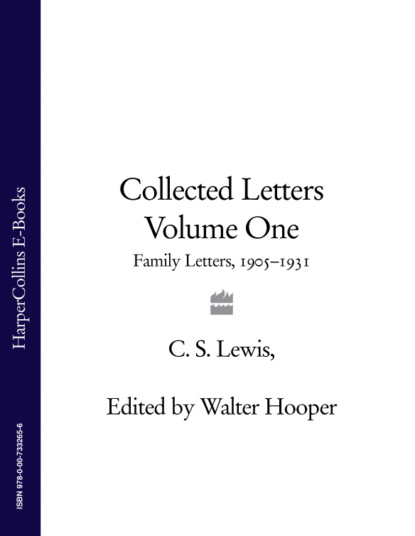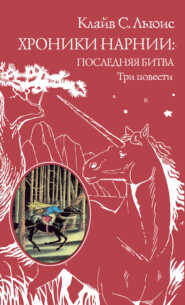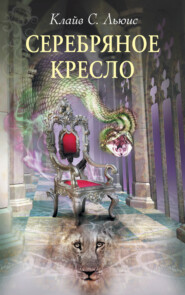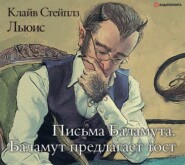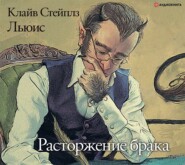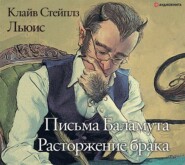По всем вопросам обращайтесь на: info@litportal.ru
(©) 2003-2024.
✖
Collected Letters Volume One: Family Letters 1905–1931
Настройки чтения
Размер шрифта
Высота строк
Поля
2 (#ulink_249bdda2-478f-5542-9535-e4d083727461) ‘The good matron’ was Miss Backhurst, of whom Warnie wrote: ‘She was better known and abominated by many generations of School House boys under her usual appellation of “The Old Bitch”. She was a weak, spiteful, fussy, prying old woman, absurdly sensitive on the point of dignity, and like so many stupid women, always seeing ridicule where none was intended’ (LP IV: 131).
3 (#ulink_86050ced-06f6-5705-8682-a104d2a259f9) Sir Arnold Lunn, The Harrovians (1913).
4 (#ulink_82df0668-932d-5207-bbb8-36de01d68d45) James Craig, first Viscount Craigavon (1871-1940), statesman. He was born in Belfast and was the MP for East Down 1906-18; MP for Mid-Down 1918-21; parliamentary secretary to the Ministry of Pensions 1919-20 and to the Admiralty 1920-1. He was chief secretary to Sir Edward Carson in opposing home rule, and was active in organizing means of resistance in Ulster. He was the first prime minister of Northern Ireland 1921-40. Captain Craig, as he was in 1914, was a very popular figure in the North of Ireland, and his house was about a hundred yards from Little Lea.
5 (#ulink_88707845-907b-516e-8faa-e0b7f8c488b2) H.M.A. Guerber, Myths of the Norsemen from the Eddas and Sagas (1908).
6 (#ulink_b8c9abc8-570e-5122-88ba-bbd44bdaebae) Gerard Parker (1896-?) was in School House 1910-14, and was school prefect. After leaving Malvern he went to Sandhurst, passing from there in 1915 into the Devon Regiment. He was promoted to lieutenant in 1917 and during the war he was mentioned in despatches. He made captain in 1926, and retired in 1931.
7 (#ulink_5982a047-2ad7-5fc3-aefc-e2341c0d8bf5) Canon James had been succeeded as headmaster by Frank Sansome Preston (1875-1970) who had been educated at Marlborough College and Pembroke College, Cambridge. He was an assistant master at Marlborough 1899-1914, and headmaster of Malvern 1914-37.
8 (#ulink_abf9143a-99db-5339-839b-4920decaa819) In SBJ VII Lewis said that while ‘Smewgy’ was the major blessing of Malvern, the other ‘undisguised blessing of the Coll was “the Gurney”, the school library; not because it was a library, but because it was a sanctuary As the negro used to become free on touching English soil, so the meanest boy was “unfaggable” once he was inside the Gurney.’
9 (#ulink_eec0838d-ebc8-5274-bf0b-ec727256047b) Robert Bridges (1844-1930), Poet Laureate from 1913. His poetry appeared in a single volume in 1912, and this was probably what Lewis was reading.
10 (#ulink_eec0838d-ebc8-5274-bf0b-ec727256047b) Emily Brontë, Wuthering Heights (1847).
11 (#ulink_bb614b4c-45b2-5776-81f5-537881454839) Annie Strahan was the cook-housekeeper at Little Lea, 1911-17.
12 (#ulink_9dac614d-5b58-5bba-8c2d-1a6f18ae6588) The tragedy, Norse in subject and Greek in form, which Lewis was writing.
13 (#ulink_9dac614d-5b58-5bba-8c2d-1a6f18ae6588) The Greeves’s home in Circular Road was directly across from Little Lea.
14 (#ulink_a57574f4-172b-59ec-8349-2cf7898b7455) Joel 1:4.
15 (#ulink_b9398658-9bc0-5ad7-b153-c5e0ec7b23cb) Arthur Christopher Benson, The Upton Letters (1905).
16 (#ulink_296e4160-5a43-5571-bf19-4473f9bcfa9b)The Times (2 June 1914), p. 9.
17 (#ulink_94d3adf7-6b34-52df-8c35-bd31537053d4) Sir Edward Elgar (1857-1934), composer, who rose to international fame about 1900 through his choral and orchestral music. He was living in Worcester at this time.
18 (#ulink_0a4f7404-24c1-5fb0-8651-74fc7eb655ff) John Henry Newman, Verses on Various Occasions (1868).
19 (#ulink_0a4f7404-24c1-5fb0-8651-74fc7eb655ff) Newman’s Dream of Gerontius depicts the journey of the soul to God at the hour of death. In 1900 it was set to music by Elgar, who regarded the work as his masterpiece. Lewis came to like the Dream very much in later life and in a discussion of Purgatory in chapter 20 of Letters to Malcolm (1964) he said ‘the right view returns magnificently in Newman’s Dream.
20 (#ulink_de4b4773-0a16-50af-ab6b-787bad95d556) Cedric Edwin Hamley (1899-1997) was an exact contemporary of Jack Lewis in School House, having arrived in the third term of 1913. He left in 1915 and served in the war with the London Rifle Brigade. He was afterwards a 2nd lieutenant in the RAF, and a captain in the 3rd London Fusiliers from 1922-28. He worked in the family business, C. Hamley Ltd. in London.
21 (#ulink_b7859b6e-965a-5dc1-b1eb-887b968dfbd2) It is reproduced in LP IV: 198-200.
22 (#ulink_fee09f51-21b0-5f33-9b3f-64998741736e) William Shakespeare, As You Like It (1623).
23 (#ulink_fee09f51-21b0-5f33-9b3f-64998741736e) Oliver Goldsmith, The Vicar of Wakefield (1766).
24 (#ulink_b8eb686d-c9ef-50aa-98d1-55a53c431fcf) George Louis Kirkpatrick (1882-1943) was the only child of Mr and Mrs Kirkpatrick. He was born 23 May 1882 when his father was still headmaster of Lurgan College, and educated in England at Charterhouse 1896-99. From there he went to work for the electrical engineers, Browett, Lindley & Co., English Makers of Patricroft, Manchester. When Mr Kirkpatrick retired from Lurgan he and Mrs Kirkpatrick moved to Manchester to be near him. Now Louis was in a camp near Great Bookham. He was general manager of Bruce Peebles & Co. (Engineers) in Edinburgh from 1932 until his death in 1943.
25 (#ulink_fde5e973-c175-59f9-8825-5ac1142bc87f) Arthur had given him H.G. Wells’ The Country of the Blind, and Other Stories [1911].
26 (#ulink_fde5e973-c175-59f9-8825-5ac1142bc87f) In Jane Austen’s Sense and Sensibility (1811).
27 (#ulink_eb90ff20-be69-5eef-b798-7d841739d9fb) Homer, the Greek poet generally believed to have lived in about the eighth century BC, is famous for his two epics, the Iliad and the Odyssey. Mr Kirkpatrick wasted no time preparing Lewis to undertake these Greek masterpieces. ‘We opened our books at Iliad, Book I,’ Lewis wrote in SBJ IX. ‘Without a word of introduction Knock read aloud the first twenty lines or so in the “new” pronunciation, which I had never heard before…He then translated, with a few, a very few explanations, about a hundred lines. I had never seen a classical author taken in such large gulps before. When he had finished he handed me over Crusius’ Lexicon and, having told me to go through again as much as I could of what he had done, left the room. It seems an odd method of teaching, but it worked. At first I could travel only a very short way along the trail he had blazed, but every day I could travel further…I was beginning to think in Greek. That is the great Rubicon to cross in learning any language.’ Lewis was using Gottlieb Christian Crusius, A Complete Greek and English Lexicon for the Poems of Homer and the Homeridae: Illustrating the Domestic, Religious, Political, and Military Condition of the Heroic Age, and Explaining the Most Difficult Passages. Translated with corrections and additions by Henry Smith. New Edition revised and edited by Thomas Kerchever Arnold (1862).
28 (#ulink_5a5248bf-5d81-5053-b895-dbafa44f84e1) Eric Robertson Dodds (1893-1979), classical scholar, was from Banbridge, County Down. He was educated at Campbell College, and University College, Oxford. At this time he was reading Literae Humaniores at University College. He took his BA in 1917. Dodds was Lecturer in Classics at University College, Reading 1919-24, Professor of Greek at the University of Birmingham 1924-36 and Regius Professor of Greek in the University of Oxford, 1936-60. See his autobiography, Missing Persons (1977).
29 (#ulink_9efcaf35-b84f-573f-a9bc-fa99de867d77) Martin Gilbert, First World War (1994), p. 25.
30 (#ulink_1c0a27ae-ec75-564c-871d-fe07ed722200) St Nicolas Church, the earliest parts of which were built in the 11th century, is mentioned in the Domesday Book. The Reverend George Shepheard Bird was rector 1905-26. Jane Austen went to St Nicolas often when her godfather was vicar.
31 (#ulink_db48c696-3322-55ce-9b89-a71b0bbf60b1) ‘The Nietzschean Way’, The Times Literary Supplement (1 October 1914), p. 442.
32 (#ulink_820d60ca-6804-58ef-b6ff-489eeb901af3) i.e. Mr Kirkpatrick.
33 (#ulink_820d60ca-6804-58ef-b6ff-489eeb901af3) H.T. Buckle, History of Civilization in England (1857; 1861).
34 (#ulink_7693a0cf-9e68-5a1e-b01b-554fb0088648) The Ewart family who lived in nearby Glenmachan House. See The Ewart Family in the Biographical Appendix.
35 (#ulink_5a0d8c85-9fc1-5d89-a074-240fb0dbf097) For some weeks the Germans had been intent on reaching the Belgian and French coastline. In an attempt to prolong the defence of their port city, Antwerp, the Belgian government appealed to Britain for troops. Thousands of British troops rushed to the aid of Antwerp, but by 10 October it was impossible to hold it against the Germans. By this time tens of thousands of Belgian refugees had arrived in England.
36 (#ulink_00a62524-bce1-5748-8abd-c4f34cc9957f) A nickname given Warnie by his father and brother.
37 (#ulink_00a62524-bce1-5748-8abd-c4f34cc9957f) Virgil (70-19 BC), the greatest Roman poet, wrote four ‘Georgics’, which are didactic poems in hexameters on Italy and traditional ways of rural life.
38 (#ulink_4ffcafcc-3277-5381-8d75-a61fd7cfeb85) T.W. Rolleston, Myths and Legends of the Celtic Race (1912).
39 (#ulink_4ffcafcc-3277-5381-8d75-a61fd7cfeb85) Whether Arthur Greeves ever attempted any part of his share in the musical drama is not known, but Lewis’s lyric text of ‘Loki Bound’ filled 32 pages of a notebook. The only part of this which has survived consists of 819 lines reproduced in LP IV: 218-20.
40 (#ulink_913c5634-3016-5f7c-8072-87252327b366) Pyotr Il’yich Tchaikovsky’s Chanson Triste was first performed in 1878.
41 (#ulink_913c5634-3016-5f7c-8072-87252327b366) The nickname of Ludwig van Beethoven’s piano sonata No. 14 in C sharp, Opus 27, No. 2 (1802).
42 (#ulink_913c5634-3016-5f7c-8072-87252327b366) Frédéric Chopin’s Marche Funêbre was first performed in 1827.
43 (#ulink_913c5634-3016-5f7c-8072-87252327b366) Edvard Grieg’s piano solo, the Peer Gynt Suite No. 2 (1893).
44 (#ulink_c5973467-9640-5fa7-bd69-9f7a74505b89) The female Fates of Norse mythology.
45 (#ulink_a98951f2-5dbc-5941-8942-559b4e8e6946) The ‘Honeymooners’ were probably Arthur’s brother, Thomas Greeves, and Winifred Lynas, who were married on 22 September 1914.
46 (#ulink_f51e6429-8b11-58c7-a338-89aba06ffead) Matthew 6:28: ‘Consider the lilies of the field, how they grow; they toil not, neither do they spin.’
47 (#ulink_86a5dd58-f12b-5c80-bffd-543990067ee4) This was Arthur’s mother, Mrs Mary Margretta (Gribbon) Greeves. See Arthur Greeves in the Biographical Appendix.
48 (#ulink_46917ddc-fdc1-5ce8-ab74-846d4bb92040) The rumour that Germany would invade England persisted for a long time and worried Albert greatly. It may have started with an article in The Times (15 October 1914) entitled ‘Will Invasion be Tried?’ in which the war correspondent said: ‘Now that the war is reaching the climax of its violence we must anticipate that all the living forces of Germany will be thrown into the conflict, and that the German navy will no longer remain inert. We must expect to be attacked at home, and must not rest under any comforting illusions that we shall not be assailed. As an attack upon us can have no serious object, unless the intention is to land an expedition in England for the purposes of compelling us to sign a disastrous peace, it is well that we should look the situation calmly in the face, and reckon up not only Germany’s power to do us harm, but also our power of resistance and means for improving it’ (p. 4).
49 (#ulink_46917ddc-fdc1-5ce8-ab74-846d4bb92040) ‘Seize the day’. Horace, Odes, Book I, Ode 11,l.8, in which the poet urges Leuconoe to take thought for the present and not to worry inordinately about the future.
50 (#ulink_0b16f7df-b8c5-593b-bec7-2be889db01d0) In a letter of 12 October, in which Warnie asked his father for a loan, he explained that he was owed money by Sandhurst and that ‘I have communicated with my bankers’ (LP IV: 229).
51 (#ulink_2db824b0-a2a4-5ede-8e2a-7c6cdde40c59) Their cousin, Hope Ewart (1882-1934), married Captain George Harding (1877-1957) in 1911 and they went to live in Dublin. Harding joined the army in 1900 and had been a member of the Army Service Corps since 1901. He was promoted to major in October 1914. He gained the DSO during the war and retired in 1928 with the rank of colonel.





